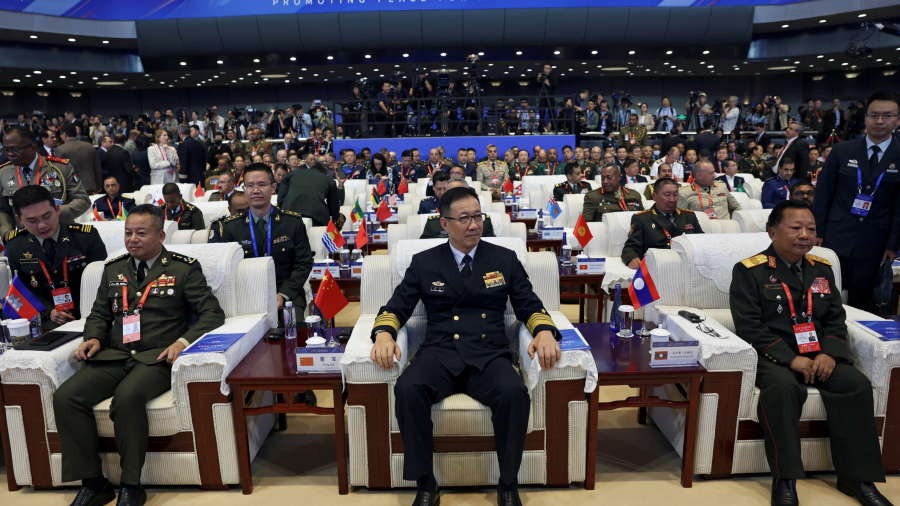Chinese and Russian defence officials openly criticized the West during the 2024 Xiangshan Security Forum held in Beijing. The forum brought together representatives from over 90 countries to discuss global security challenges. Chinese Defense Minister, Dong Jun, delivered a comprehensive speech where he emphasized that major global powers should “abandon a zero-sum mindset” and avoid “bullying smaller nations.” Without directly naming the U.S., Dong made pointed references to Western interference, stating that regional nations should work together to secure peace and maintain independence in their internal affairs.
Dong’s comments are seen as a direct response to ongoing tensions between China and the U.S., particularly over the South China Sea and Taiwan. He called for stronger military ties between China and developing nations, highlighting China’s commitment to enhancing security cooperation within the Global South.
During the same forum, Russia’s Deputy Defense Minister, Alexander Fomin, was more explicit in his criticism of the West, particularly the United States. Fomin accused the U.S. of shifting its military focus to the Asia-Pacific region to contain the influence of both China and Russia. He claimed that the U.S. is also preparing for war in Asia by creating new security alliances aimed at isolating both nations. According to Fomin, NATO countries are planning to send troops to Ukraine to support Kyiv’s war efforts under “Kyiv’s formulas”—an action he warned could lead to a direct conflict between nuclear powers.
Fomin’s claims were countered by NATO, which has consistently stated that it has no plans to deploy troops in Ukraine. However, his rhetoric highlighted Russia’s view that the West, particularly the U.S., is deliberately escalating tensions in global conflict zones.
Both Dong and Fomin promoted the idea of a multipolar world order based on mutual respect and equality, rejecting the West’s dominance in global politics. They argued that countries should be allowed to pursue their own paths to development and security without foreign interference.
The 2024 Xiangshan Forum serves as a platform for China and Russia to bolster their global military diplomacy. China, in particular, has been positioning itself as a responsible mediator in international crises, despite ongoing territorial disputes in the East Asia region. The forum, themed “Promoting Peace for a Shared Future,” underscores China’s commitment to resolving regional tensions through diplomatic means, while simultaneously building stronger military relationships with neighbouring countries.
Despite the forum’s agenda to foster peace, the presence of tensions was palpable as global powers navigated complex relations. U.S. Deputy Assistant Secretary of Defense, Michael Chase, represented the United States and is set to hold military discussions with Chinese officials following the forum. These discussions mark a continuation of efforts by the U.S. and China to re-establish military communications, which were disrupted due to heightened tensions.
Chase’s participation in the forum also serves as a signal that the U.S. remains committed to diplomatic engagement with China, despite the growing rivalry between the two nations. According to a former senior Pentagon official for China, Chad Sbragia, U.S. involvement symbolizes its willingness to engage in dialogue, even as the two countries face deep divisions over key geopolitical issues.
Another significant topic at the forum was the friction between China and the Philippines over recent South China Sea disputes. Although the Philippines is a U.S. treaty ally, Chinese military officials expressed confidence that such tensions would not trigger direct conflict between China and the U.S.
As the forum progresses, diplomatic analysts will be watching closely for any signs of progress in U.S.-China military relations, particularly given the recent resumption of defence coordination talks between the two nations after a long hiatus.
This year’s forum comes shortly after U.S. National Security Adviser Jake Sullivan met with Chinese military leaders in Beijing, signaling a renewed effort to manage tensions diplomatically. Both China and the U.S. have held their first-ever theatre-level military conference call in recent days, which many observers see as a positive step toward stabilizing relations.
China continues to use forums like Xiangshan to promote itself as a responsible power committed to global peace, while also consolidating its influence in developing nations. Dong Jun, although not a member of China’s Central Military Commission, plays a key role in China’s military diplomacy. His appointment in December 2023 followed a major anti-corruption purge within China’s military ranks, further underscoring Beijing’s push to present a responsible and clean image on the global stage.
By engaging in military diplomacy and promoting peace initiatives, China aims to strengthen its role as a major global player, even as it faces ongoing tensions with Western nations over key geopolitical issues.
